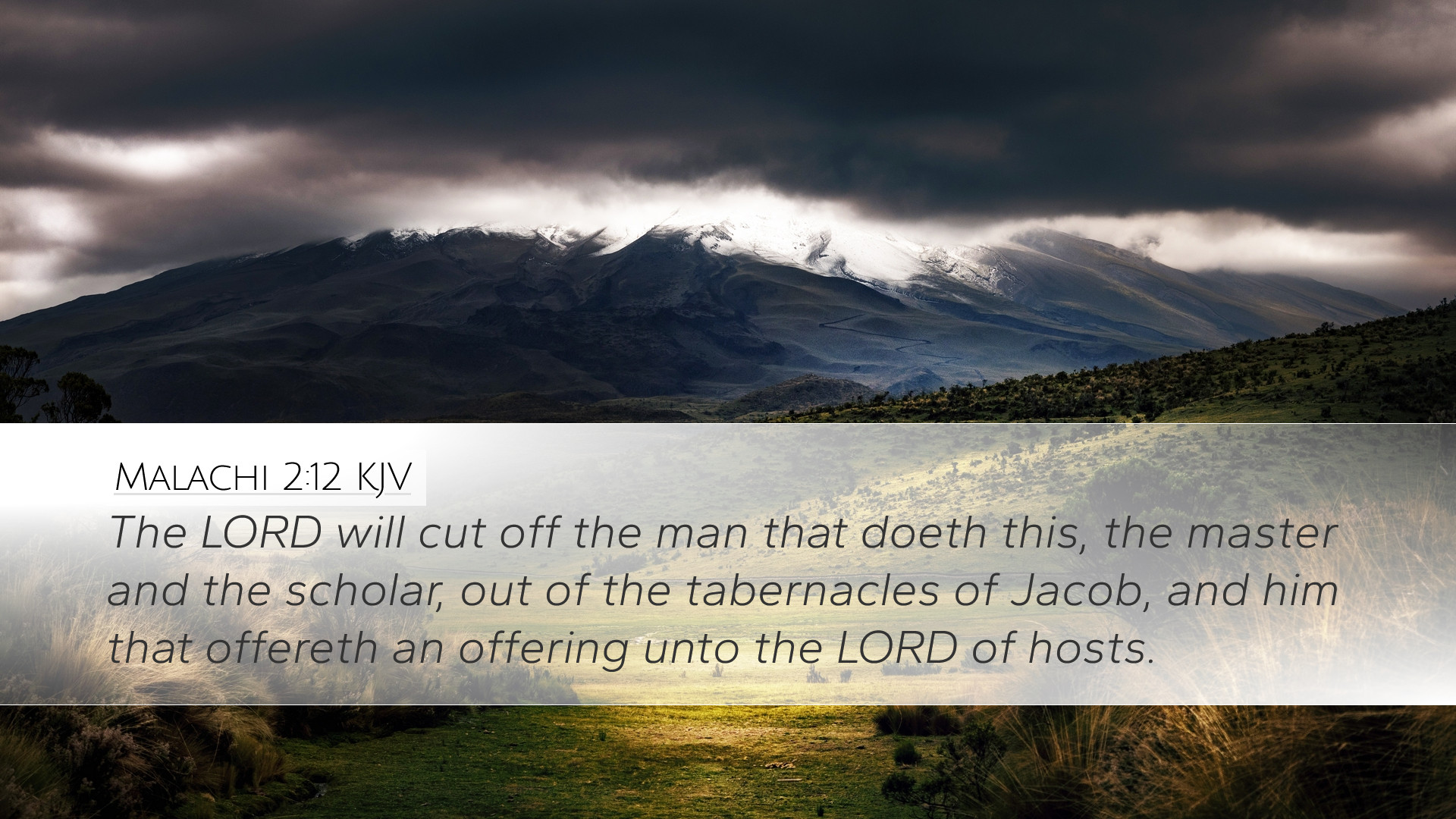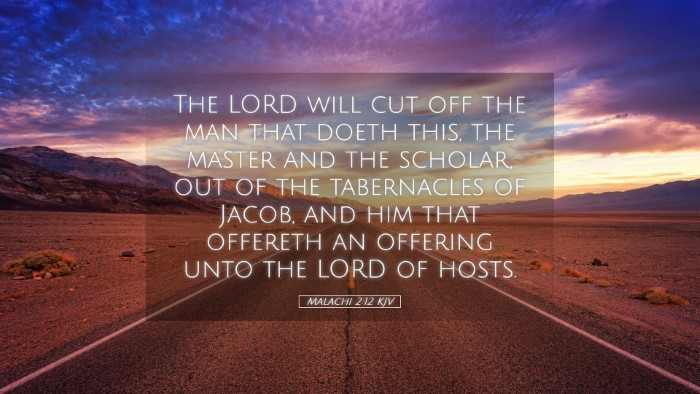Old Testament
Genesis Exodus Leviticus Numbers Deuteronomy Joshua Judges Ruth 1 Samuel 2 Samuel 1 Kings 2 Kings 1 Chronicles 2 Chronicles Ezra Nehemiah Esther Job Psalms Proverbs Ecclesiastes Song of Solomon Isaiah Jeremiah Lamentations Ezekiel Daniel Hosea Joel Amos Obadiah Jonah Micah Nahum Habakkuk Zephaniah Haggai Zechariah MalachiMalachi 2:12
Malachi 2:12 KJV
The LORD will cut off the man that doeth this, the master and the scholar, out of the tabernacles of Jacob, and him that offereth an offering unto the LORD of hosts.
Malachi 2:12 Bible Commentary
Commentary on Malachi 2:12
Malachi 2:12 states: "May the Lord cut off from the tents of Jacob any descendent of the man who does this, and yet brings an offering to the Lord Almighty."
Introduction
The book of Malachi serves as a poignant call back to fidelity in worship and observance of the covenant, representing God’s concerns through the post-exilic community. This particular verse encapsulates the gravity of unfaithfulness and the serious consequences of violating divine commandments, especially regarding marriage and worship.
The Context of Malachi 2:12
Malachi's prophetic utterances occur in a context of spiritual complacency among the Israelites. They had returned from Babylonian captivity, yet had fallen into various socio-religious ills, including intermarriage with foreign women and neglect of proper offerings. This verse acts as a harsh reminder of the divine standards of holiness and the impending judgment on those who stray.
Analysis of Key Components
-
"May the Lord cut off from the tents of Jacob"
Here, cut off refers to a severance of connection, implying the removal of individuals from the communal life of Israel. Matthew Henry emphasizes that this severing is not merely physical but carries spiritual implications, highlighting the seriousness of breaking covenant with God.
-
"Any descendant of the man who does this"
This phrase underscores the idea of communal responsibility; the actions of one can have ramifications for future generations. Adam Clarke notes the stark warning against those who presumptively approach God while harboring sin in their lives, pointing to the communal holiness expected of God’s people.
-
"And yet brings an offering to the Lord Almighty"
This juxtaposition of bringing an offering while engaging in unholy practices reveals the hypocrisy prevalent within the community. Albert Barnes highlights the irony of presenting sacrifices to God while living in disobedience to His commands, portraying a facade of piety devoid of true devotion.
Theological Insights
-
The Nature of God’s Holiness
This verse highlights the foundational aspect of God's nature—His holiness. Any act of worship must stem from a heart aligned with His commandments. As Henry notes, the Lord desires authenticity in worship: external offerings are meaningless without internal integrity.
-
The Consequences of Infidelity
The severe warning emphasizes that God will not accept worship that is tainted by unfaithfulness. Clarke points out that the penalties pertaining to the violation of covenantal faithfulness resonate throughout Scripture, teaching that neglect of divine standards leads to judgment.
-
Covenantal Relationships
The idea of 'cutting off' relates directly to the covenant established with Jacob, illustrating the communal and familial aspects of faith. Barnes remarks that such judgments serve to uphold the sanctity of the covenant community as a reflection of God's character.
Practical Applications
This verse serves as a vital reminder for contemporary believers about the significance of integrity in relationship with God. Pastors and leaders are called to emphasize the necessity of right living as a precursor to genuine worship.
-
Integrity in Worship
Believers must examine their lives for hypocrisy, ensuring actions reflect true devotion to God. Worship should not merely become a ritual, but an act of sincere gratitude and obedience.
-
Family and Community Faithfulness
As this passage speaks to the communal aspect of consequences, leaders should foster an environment encouraging mutual discipleship and accountability within the church community.
-
Commitment to Covenant Relationships
Understanding the seriousness of the covenant should prompt individuals to uphold their commitments, whether in marriage or within the church body, reflecting God's faithfulness in their own relationships.
Conclusion
Malachi 2:12 challenges us to realize that our approach to worship must align with a life of holiness and faithful obedience. As believers reflect on this verse, may it invoke a spirit of repentance and a renewed commitment to living out their faith authentically, honoring God in all aspects of life.


